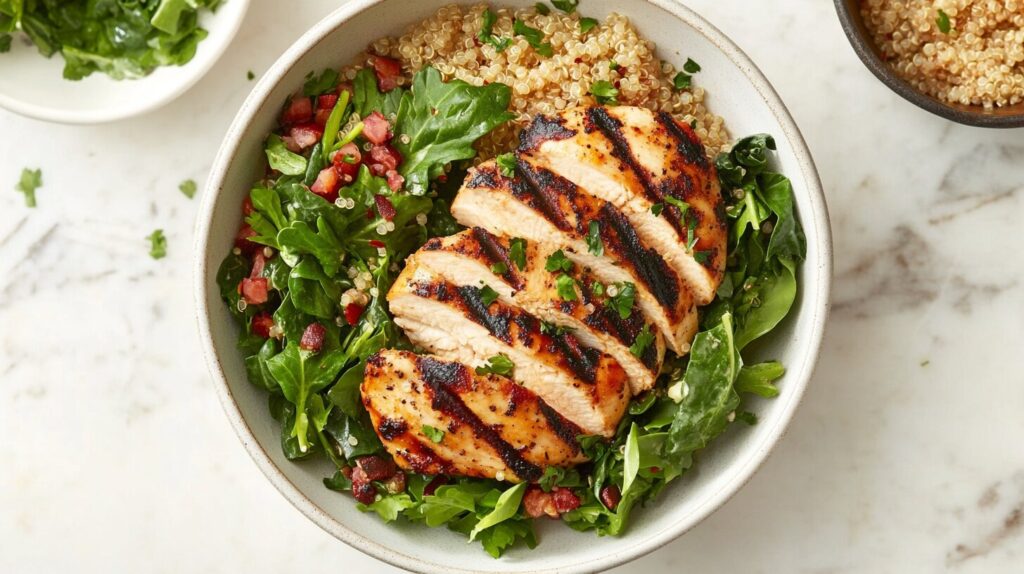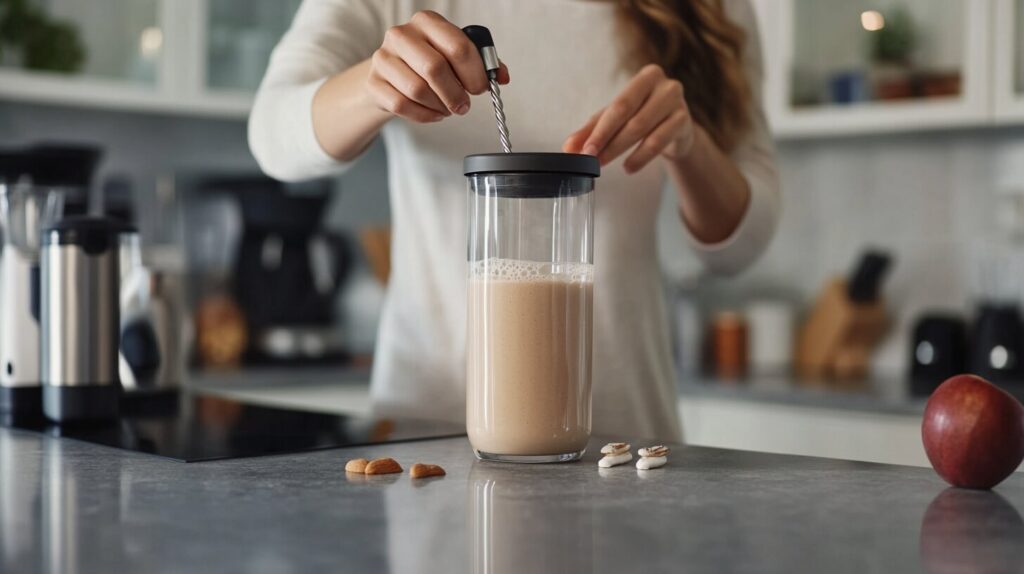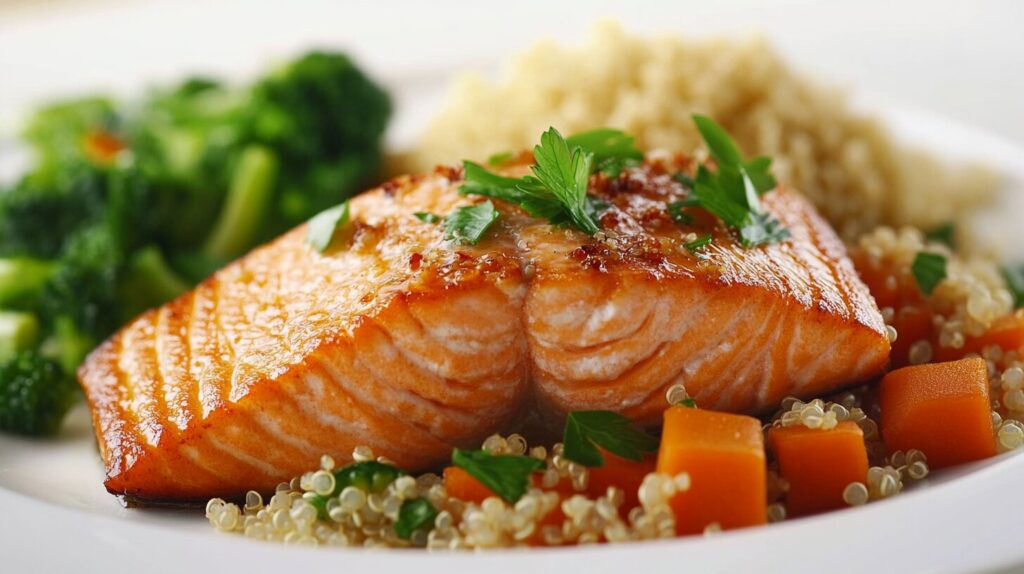
If you have Polycystic Ovary Syndrome (PCOS), you probably know how tricky it can be to manage your symptoms. Between fluctuating hormones, insulin resistance, and weight gain, it’s no walk in the park. But what if I told you that protein intake for PCOS could be your secret weapon? 🥩💪
This article breaks down exactly how much protein intake for PCOS you need daily, why it matters, and how to add it to your meals without pulling your hair out. Ready to jump in? Let’s go!
Table of Contents
Understanding PCOS and Its Impact on Health
Before we dive into protein specifics, let’s get clear on what PCOS is and why it affects your body the way it does.
What is PCOS?
Polycystic Ovary Syndrome, or PCOS, is a common hormonal disorder that affects about 1 in 10 women of childbearing age. It’s characterized by irregular periods, ovarian cysts, and elevated levels of male hormones (androgens). But that’s just the tip of the iceberg.
If you have PCOS, your hormones are often out of balance, and this can lead to frustrating symptoms like:
- Irregular or absent periods
- Acne or oily skin
- Excess hair growth (hello, unwanted mustache!)
- Hair thinning or loss 😔
- Weight gain, especially around your midsection
It’s a lot to deal with, but understanding it is the first step to managing it.
Common Symptoms of PCOS
PCOS symptoms can vary from woman to woman, but here are the most common ones:
- Insulin Resistance: Your body struggles to use insulin effectively, which can lead to higher blood sugar levels and weight gain.
- Infertility: Because of irregular ovulation, getting pregnant can be a challenge.
- Mood Swings: Hormonal imbalances can leave you feeling like you’re on an emotional rollercoaster. 🎢
PCOS can feel like your body is constantly fighting against you. But with the right diet—especially the right amount of protein—you can take back control.
The Role of Nutrition in Managing PCOS
So why does nutrition matter so much with PCOS? Because what you eat directly influences your hormones, blood sugar, and weight.
Think of your body as a car engine. The right fuel (in this case, nutrients) keeps everything running smoothly. Protein is one of the key fuels your body needs to regulate hormones and keep you feeling full and satisfied.
“You can’t outrun a bad diet, especially with PCOS. Your food choices are your most powerful tool.”
Why Protein is Important for Women with PCOS
Protein intake for PCOS isn’t just for bodybuilders or gym enthusiasts. For women with PCOS, it can be a game-changer. Let’s explore why.
How Protein Affects Hormone Regulation
When you have PCOS, your hormones are often out of whack. Eating enough protein helps balance key hormones like insulin and cortisol.
Here’s the science simplified:
- Protein helps lower insulin levels by slowing down how quickly sugar enters your bloodstream. This can reduce insulin resistance, a common problem in PCOS.
- It supports hormone production: Your body uses amino acids (the building blocks of protein) to create hormones and enzymes that keep everything in balance.
In short: More protein = happier hormones. 🎉
Protein and Insulin Resistance in PCOS
One of the biggest challenges with PCOS is insulin resistance. This means your body needs more insulin to manage blood sugar, which often leads to weight gain.
But here’s where protein shines! 🌟
- Protein slows down digestion: When you eat protein, it slows the absorption of sugar into your blood.
- Reduces cravings: Ever get that 3 PM sugar craving? Eating protein-rich meals helps you stay fuller longer, reducing the urge to snack on junk food.
For women with PCOS, stabilizing blood sugar is like hitting the reset button on your metabolism.
Protein’s Role in Weight Management
Let’s be real: losing weight with PCOS can feel like trying to solve a Rubik’s cube blindfolded. 🤯 But protein can help.
Here’s how:
- Boosts Metabolism: Your body burns more calories digesting protein compared to carbs or fats.
- Reduces Appetite: Protein triggers hormones that make you feel full (like GLP-1 and PYY).
- Preserves Muscle Mass: When you’re trying to lose weight, protein helps you keep your muscle, which keeps your metabolism high.
“Think of protein as your personal trainer in food form—helping you burn fat, feel full, and stay strong.”
How Much Protein Do You Actually Need?
Okay, so protein is amazing. But how much protein intake for PCOS do you need? Let’s break it down.
Recommended Daily Protein Intake Guidelines
For the average adult woman, the Recommended Dietary Allowance (RDA) for protein intake for PCOS is 0.8 grams per kilogram of body weight. But if you have PCOS, you might need more to manage your symptoms effectively.
General guidelines for women with PCOS:
- Moderate Protein Intake: Aim for 1.2 to 1.5 grams per kilogram of body weight.
- Higher Protein Intake: If you’re physically active or trying to lose weight, you might go up to 1.6 to 2.0 grams per kilogram.
Example Calculation
Let’s say you weigh 70 kg (about 154 pounds).
- Moderate Protein: 70 kg × 1.2 g = 84 grams of protein per day
- Higher Protein: 70 kg × 1.6 g = 112 grams of protein per day
This might sound like a lot, but once you break it down into meals, it’s totally doable!
Factors That Influence Protein Needs
Your protein needs aren’t one-size-fits-all. Here are some factors that can affect how much protein you need:
- Activity Level: If you’re hitting the gym regularly, your muscles need more protein to recover.
- Weight Goals: Trying to lose weight? Higher protein can help.
- Age: As you get older, you might need more protein to maintain muscle mass.
Protein Requirements for Active vs. Sedentary Women with PCOS
- Active Women: For optimal protein intake for PCOS, if you work out 3-5 times a week, aim for 1.6-2.0 grams per kilogram.
- Sedentary Women: If you’re not very active, 1.2-1.5 grams per kilogram is a good range.
Remember, it’s all about balance. You don’t need to chug protein shakes all day—just make sure you’re getting enough from your meals.
Best Sources of Protein for PCOS Management
Now that you know how important protein is for managing PCOS, you might be wondering, “Where do I get all this protein?” Luckily, you have plenty of delicious and versatile options! Let’s explore the best protein sources that fit into your PCOS-friendly diet.
Animal-Based Protein Options
Animal proteins are excellent because they provide all nine essential amino acids your body needs. Here are some great options to include in your diet:
- Chicken Breast 🍗 – Lean, versatile, and packed with protein. A 3-ounce serving has about 26 grams of protein.
- Eggs 🥚 – Nature’s perfect protein. One large egg has about 6 grams of protein and a mix of healthy fats.
- Greek Yogurt – Creamy and filling. A cup of plain Greek yogurt can give you 15-20 grams of protein.
- Salmon 🐟 – Not only rich in protein (about 22 grams per 3-ounce serving), but also packed with omega-3 fatty acids, which help reduce inflammation.
- Lean Beef 🥩 – Provides about 25 grams of protein per 3-ounce serving, plus iron and B vitamins.
“Lean meats and fish can be your allies in the battle against PCOS. They’re like the knights protecting your metabolic kingdom.”
Plant-Based Protein Options
If you prefer a plant-based diet or just want to mix things up, there are plenty of protein-rich options:
- Legumes (Beans, Lentils, Chickpeas) – These provide 15-18 grams of protein per cooked cup and are loaded with fiber.
- Tofu and Tempeh – Tofu offers 10 grams of protein per 1/2 cup, while tempeh packs an impressive 20 grams.
- Quinoa – A complete protein with about 8 grams per cup. Plus, it’s gluten-free!
- Chia Seeds 🌱 – Small but mighty! Just 2 tablespoons provide 5 grams of protein and omega-3s.
- Edamame – Young soybeans that pack 17 grams of protein per cup.
Plant proteins are fantastic, but you may need to eat a variety of them to get all the essential amino acids.
Protein Supplements: Are They Necessary?

Protein supplements can be helpful if you struggle to meet your daily intake through food alone. But are they necessary?
✅ When to Use Protein Supplements:
- Busy Schedule: When you’re short on time and need a quick protein boost.
- Post-Workout Recovery: Helps repair muscles after exercise.
- Dietary Restrictions: If you’re vegan or vegetarian and need an extra boost.
🚫 When to Skip Them:
- If you’re already getting enough protein from whole foods.
- If you experience digestive issues with supplements.
Popular Options:
- Whey Protein – Quick-digesting and effective, but not suitable if you’re lactose intolerant.
- Plant-Based Proteins (Pea, Hemp, Soy) – Great for vegans and those with dairy sensitivities.
“Think of protein supplements as your ‘backup plan’—helpful, but not a replacement for real food.”
Meal Planning: How to Incorporate Protein in Your Daily Diet
Knowing how much protein you need is one thing; figuring out how to eat it is another! Here’s how to easily incorporate protein into your meals.
High-Protein Breakfast Ideas

Starting your day with protein helps stabilize your blood sugar and keeps you feeling full. Here are some easy and delicious ideas:
- Greek Yogurt Parfait 🍓 – Mix Greek yogurt with berries, chia seeds, and a sprinkle of nuts.
- Egg Muffins 🧁 – Whisk eggs with veggies and bake in muffin tins for a grab-and-go breakfast.
- Smoothie Bowl 🥤 – Blend protein powder, spinach, banana, and almond milk. Top with nuts and seeds.
Protein-Packed Lunch and Dinner Recipes

Lunch and dinner are prime times to get a hearty dose of protein. Here are some satisfying meal ideas:
- Grilled Chicken Salad 🥗 – Toss grilled chicken with leafy greens, avocado, and a lemon vinaigrette.
- Salmon with Quinoa 🍽️ – Baked salmon served over a bed of quinoa and roasted veggies.
- Bean and Lentil Chili 🌶️ – A warm, comforting bowl loaded with beans, lentils, and spices.
These meals are not only high in protein but also packed with fiber and nutrients to help manage PCOS symptoms.
Healthy Protein Snacks for PCOS
Snacks are a great way to sneak in extra protein. Here are a few ideas to keep you energized:
- Hummus and Veggies 🥕 – A classic combo with fiber and protein.
- Hard-Boiled Eggs – Easy to prep ahead and take on the go.
- Nut Butter on Apple Slices 🍎 – A sweet and satisfying snack with protein and healthy fats.
Common Challenges in Meeting Protein Goals with PCOS
Even with the best intentions, you might hit some roadblocks when trying to increase your protein intake. Let’s talk about the most common challenges and how to tackle them.
Struggling with Cravings and Overeating
PCOS often brings intense sugar cravings. Why? Because your blood sugar can swing like a pendulum.
Solution:
- Eat protein with every meal to stabilize your blood sugar.
- Snack smart with high-protein options like Greek yogurt or nuts.
Digestive Issues Related to High-Protein Diets
Too much protein can sometimes lead to bloating or constipation, especially if you’re not getting enough fiber.
Solution:
- Balance protein with plenty of veggies and whole grains.
- Drink enough water to keep things moving smoothly. 💧
Balancing Protein with Other Nutrients
Focusing on protein is great, but you also need carbs, fats, and fiber to stay healthy.
Solution:
- Follow the “Plate Method”: Fill half your plate with veggies, a quarter with protein, and a quarter with healthy carbs.
- Include healthy fats like avocado, olive oil, and nuts to round out your meals.
“It’s not just about eating more protein; it’s about creating balanced meals that work for your body.” 🥗
Solutions to Overcome Protein Intake Problems
Managing protein intake for PCOS can sometimes feel like climbing a steep hill, but the right strategies can make it much smoother. Here are practical solutions for overcoming the most common challenges.
Managing Appetite and Cravings
PCOS-related cravings can feel like an uphill battle, especially when your body is begging for sugar or carbs. But protein can help you win this fight!
Solutions:
- Eat Balanced Meals: Include a source of protein, healthy fats, and fiber with every meal. For example, pair grilled chicken with avocado and quinoa.
- Prioritize Protein Early in the Day: A protein-rich breakfast helps keep cravings at bay later.
- Stay Hydrated: Sometimes thirst masquerades as hunger. Drink water throughout the day to stay hydrated.
Pro Tip: If you feel a craving sneaking up, grab a protein-rich snack like nuts or a hard-boiled egg instead of reaching for sugary treats. 🍬❌
Easy Digestive Fixes for High-Protein Diets
Bloating or constipation when increasing protein intake is a common issue, especially if your fiber intake is low. Here’s how to ease digestion:
Solutions:
- Add More Fiber: Balance your protein with high-fiber foods like vegetables, beans, and whole grains.
- Stay Active: Gentle exercise like walking or yoga can help improve digestion.
- Probiotic Foods: Include probiotic-rich foods like yogurt, kefir, and sauerkraut to promote gut health.
“Think of your digestion as a garden—protein is the soil, and fiber is the fertilizer that keeps everything thriving.” 🌱
Tips for Balanced, Sustainable Meal Planning
Sustainability is key to making any dietary change stick. Here are some tips to help you plan protein-rich meals without burning out:
- Meal Prep on Weekends: Cook proteins like chicken, tofu, or lentils in bulk to have them ready for the week.
- Rotate Protein Sources: Switch between animal and plant proteins to keep meals exciting and nutritionally balanced.
- Use Simple Recipes: Don’t overcomplicate it. A quick stir-fry or grilled salmon with veggies can be just as nutritious as a gourmet meal.
Myths and Misconceptions About Protein and PCOS
When it comes to protein and PCOS, there are plenty of myths floating around. Let’s clear up the confusion.
Does Too Much Protein Cause Weight Gain?
You might hear that eating too much protein can lead to weight gain. But is that true?
The Truth: Eating excessive calories from any source—whether it’s protein, carbs, or fats—can lead to weight gain. However, protein is more satiating than carbs or fats, meaning you’re less likely to overeat.
In fact, a high-protein diet can help you lose weight because it boosts metabolism and reduces cravings. So, don’t fear protein—embrace it!
Is Plant Protein Less Effective Than Animal Protein?
Some believe that plant proteins aren’t as effective as animal proteins. But let’s set the record straight.
The Truth: While most plant proteins lack one or more essential amino acids, you can still get complete protein by combining different plant sources. For example:
- Beans + Rice
- Quinoa + Chickpeas
- Lentils + Whole Wheat Bread
“Think of plant proteins as puzzle pieces—on their own, they’re incomplete, but together they create the full picture.” 🧩
Do Protein Supplements Harm Your Kidneys?
You may have heard that protein supplements damage your kidneys. But this is only true for people with pre-existing kidney issues.
The Truth: For healthy individuals, moderate protein intake (even from supplements) is safe. Just be mindful of your overall balance and get most of your protein from whole foods.
Real-Life Success Stories: Women Managing PCOS with Protein
Sometimes, the best motivation comes from hearing how others have succeeded. Here are two inspiring stories of women who managed their PCOS with a high-protein diet.
Case Study 1: High Protein and Weight Loss
Meet Sarah: A 32-year-old woman who struggled with weight gain due to PCOS. Despite trying multiple diets, nothing seemed to work—until she focused on protein.
What She Did:
- Increased her protein intake for PCOS to 100 grams per day.
- Ate protein with every meal (e.g., eggs for breakfast, chicken salad for lunch, and salmon for dinner).
- Swapped high-carb snacks for protein-rich options like nuts and Greek yogurt.
The Result: In 6 months, Sarah lost 25 pounds, stabilized her blood sugar, and felt more energized than ever.
Sarah says: “Adding more protein was the easiest change I made, and it completely transformed how I felt.”
Case Study 2: Improved Energy Levels
Meet Emma: A 28-year-old who dealt with fatigue and mood swings due to PCOS. She felt drained and unmotivated until she started prioritizing protein.
What She Did:
- Focused on plant-based proteins like lentils, quinoa, and tofu.
- Added protein shakes after workouts to support muscle recovery.
- Ensured each meal contained at least 20 grams of protein.
The Result: Emma reported higher energy levels, fewer mood swings, and improved focus within 3 months.
Emma shares: “Protein gave me back my energy. I no longer feel like I’m dragging myself through the day.” 💪
Explore More Tips and Recipes for Managing PCOS
Looking for more ways to support your health with PCOS? Check out these related articles to help you stay on track with your nutrition and lifestyle:
- Discover Delicious and Nutritious PCOS Recipes for a Healthy Lifestyle to keep your meals satisfying and hormone-friendly.
- Need structure? Find balance with What is a Good Meal Plan for PCOS? to simplify your weekly planning.
- Learn about the Best Morning Drink for PCOS to jumpstart your day with energy and balance.
- Craving carbs but unsure what’s safe? Explore What Pasta Can I Eat with PCOS? for satisfying options.
- Not sure where to start with healthy snacks? These Rice Cakes Benefits and Recipes for Healthy Snacking are perfect for curbing cravings.
- For a protein boost, try The Ultimate Guide to Beef Round Steak Recipes for hearty, high-protein meals.
- Curious about alternatives? Check out Matcha Muffin Recipe with Almond Flour for a healthy twist on baking.
Explore these guides and make managing your PCOS easier, one step at a time! 🌟
Conclusion: Optimizing Protein for Better PCOS Management
By now, you know that protein intake for PCOS isn’t just a ‘nice-to-have’—it’s a must-have. Whether you’re aiming to lose weight, balance your hormones, or feel more energized, protein can be your ally.
Key Takeaways
- Aim for 1.2-1.6 grams of protein per kilogram of body weight.
- Balance protein with fiber and healthy fats to avoid digestive issues.
- Include protein at every meal to manage cravings and stabilize blood sugar.
- Mix animal and plant proteins for variety and complete nutrition.
- Don’t fear protein supplements, but use them as a backup, not a primary source.
Next Steps to Implement a Protein-Rich Diet
- Assess Your Current Diet: How much protein are you eating daily?
- Plan Your Meals: Make a weekly meal plan with protein-rich foods.
- Start Small: Add a protein-rich snack or increase protein at one meal per day.
- Track Your Progress: Notice how your energy, mood, and weight respond.
“You’ve got this! Remember, small changes add up to big results.” 🌟
